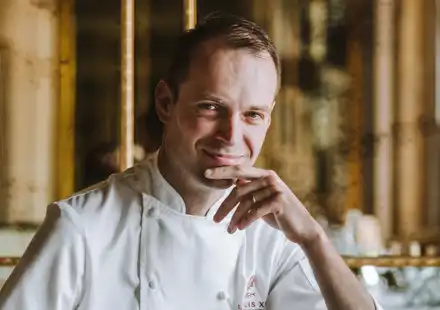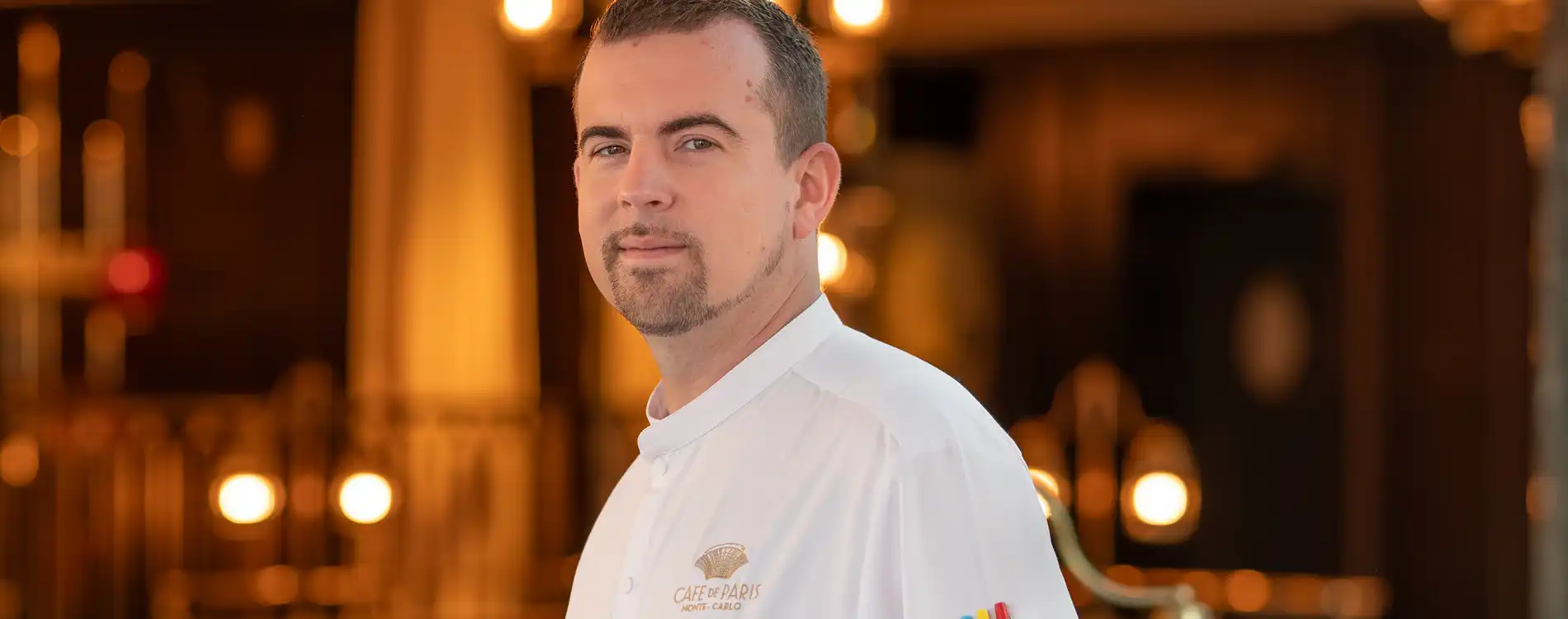Published on October 05, 2023Updated on November 29, 2023
"Café de Paris Monte-Carlo is a Parisian brasserie on Mediterranean soil." In a few words, Victor Marion sums up the very special spirit of the legendary Monegasque brasserie of which he is now the chef. After wandering around the world, he's back in Monaco, ready to write the next chapter in the history of this legendary establishment. Meet a daring and enthusiastic chef.
You started out in Nice, then in Monaco, at the Hôtel Hermitage Monte-Carlo... But how did you become interested in cooking ? Did you fall into it as a child ?
I always wanted to cook, without ever really knowing why! My father was a carpenter and cabinetmaker, and nobody in the family worked in cooking. Even though my mom was a great cook, I wasn't immersed in a gastronomic world.
That's what you call a vocation !
Exactly... When I started my studies, my family encouraged me. They were delighted that I had a specific idea in mind. I wasn't very committed to general studies, but I started to do very well once I started my hospitality and catering course. I even excelled in accounting and management subjects: everything interested me, because it was all linked to the cooking trade.
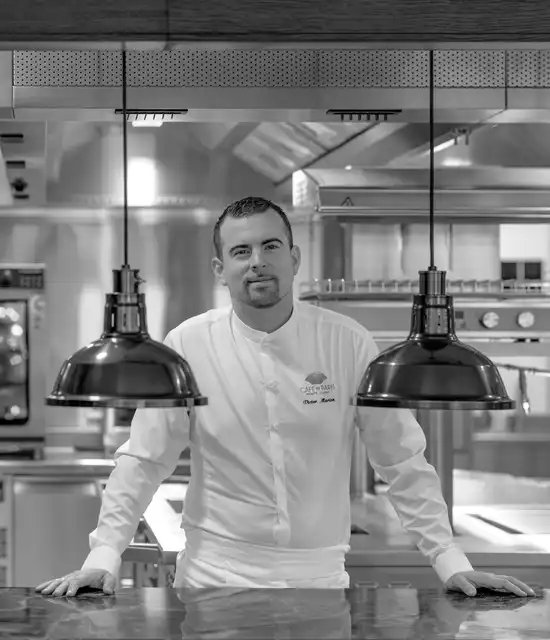
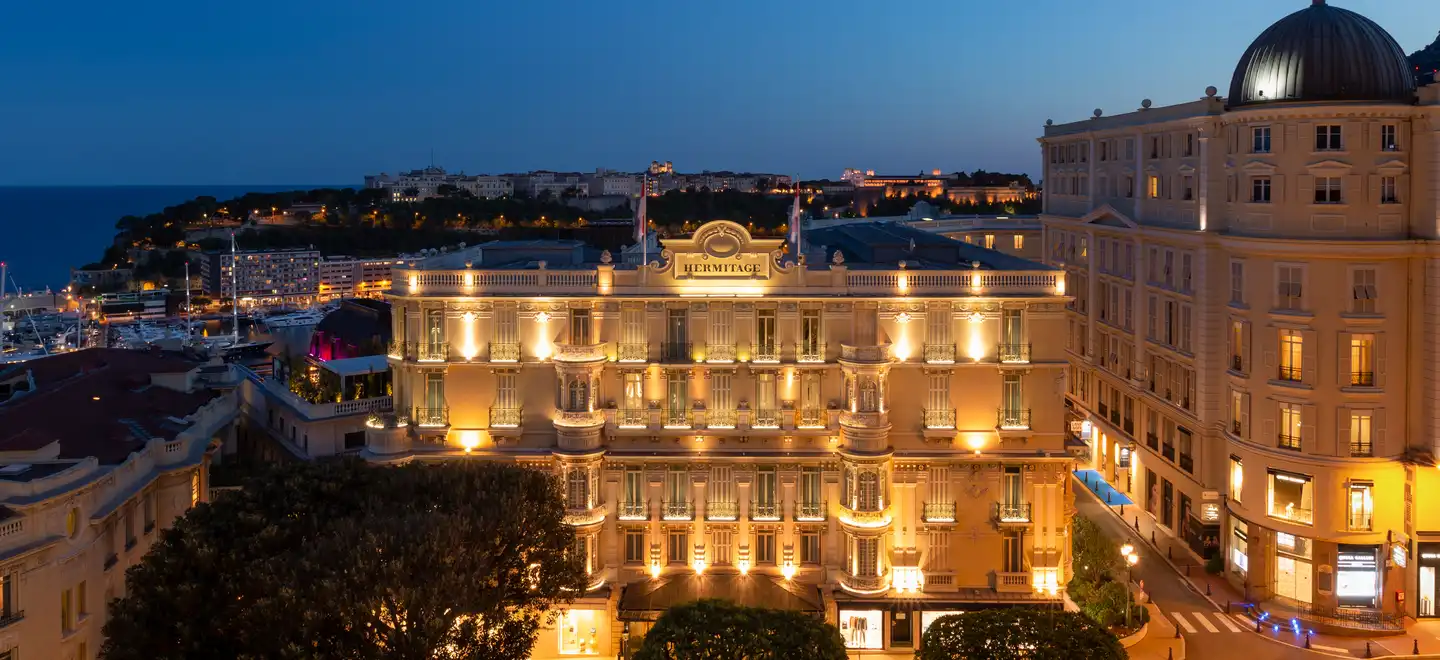
What was your first contact with gourmet cuisine ?
I had never set foot in a Michelin-starred restaurant. It all opened up to me during my first immersion in the luxury hotel industry, at the Hôtel Hermitage Monte-Carlo. It was a fantastic discovery. In Monaco, you see unique things! In one season, there are incredible events like the Formula 1 Grand Prix, and then there are extraordinary customers...
Did you realize that this was the world you wanted to work in ?
That was the turning point. Nothing could be as interesting as these luxury hotels, these incredible products, these Michelin-starred chefs... Yes, I was absolutely sure I wanted to evolve there.
At the Hôtel Hermitage Monte-Carlo, Joël Garault has been your mentor: what did he pass on to you ?
Joël Garault is a great chef, Compagnon du Tour de France, and has been a Michelin-starred chef for a long time. Among all the things he taught me, I've always remembered this sentence: "We must always strive for perfection. His vision is that, at every level, everyone should strive for excellence. Whether you're preparing a crepe for breakfast or a dish in a Michelin-starred restaurant, a brushstroke on a plate or a pinch of salt to season a product, you can't settle for anything less than perfection. This has shaped the way I work. And it was on his recommendation or through his contact that I was able to work in some of the big houses. Having a mentor's trust is a precious thing. Over the years, our relationship has remained intact.
What is your cooking philosophy ?
Simplicity, to please people. Whatever the establishment you work in, you realize that our customers' fundamental needs are the same: to feel emotions, to have pleasure. Of course, the technical and aesthetic dimension is important, but the more you progress in your career, the more you try to get to the essence : good products, things that are highly identifiable and provoke gourmet emotions. It's more complicated to bring customers back to very binary emotions that give rise to pleasure than to dazzle them with visual effects. At the beginning of your career, you want to prove things by adding elements. Later, you prove yourself by removing them. Now, when I taste dishes proposed by teams, I tend to say: what does this element add? Would it not be better to go further with the base product ?
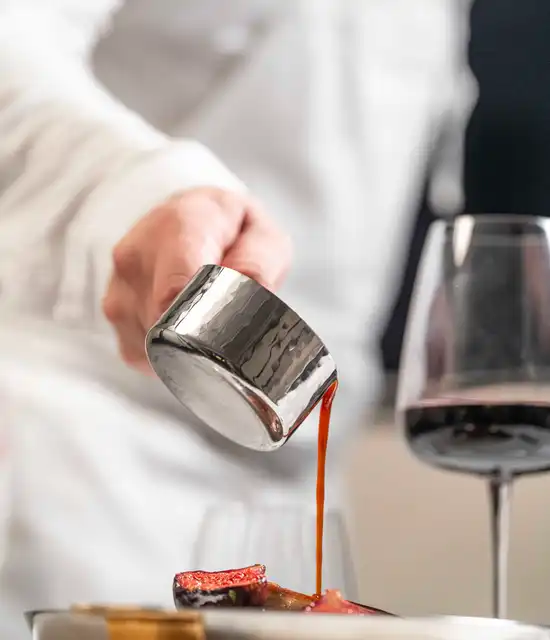
What is your advice to those starting out with you ?
The same advice I was given when I started out: take the time to learn the trade. Just like in music, you have to learn your scales. I, too, was "all fire and brimstone", I didn't take the time to fully assimilate things. Today, young people have access to content all day long. So much so, that in just one year, they sometimes feel they've done it all. I encourage them to take the time to enjoy it, especially as you can't go back on your years of apprenticeship. And it seems to me that as you get older, you become much more permeable to knowledge.
How can you still evolve and improve after years of career ?
At some point, the only thing more interesting than cooking is transmission! To keep growing, you have to make others grow. As Alain Ducasse says : it is the chefs he has trained who make his cuisine. Very early on, he devoted his career to spotting talent and passing on his vision to them.
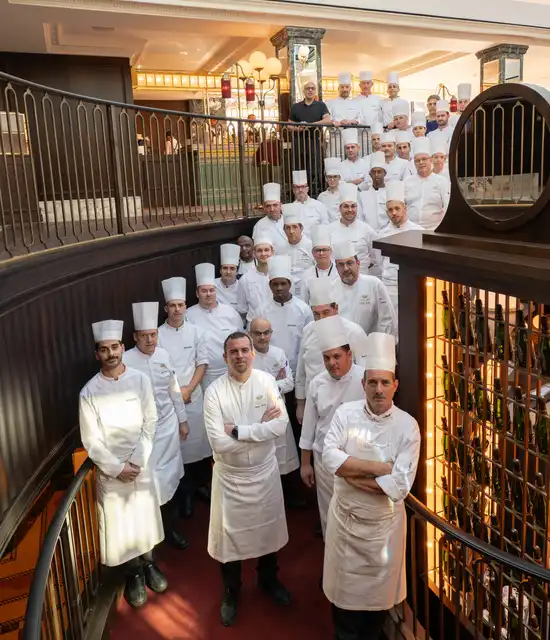
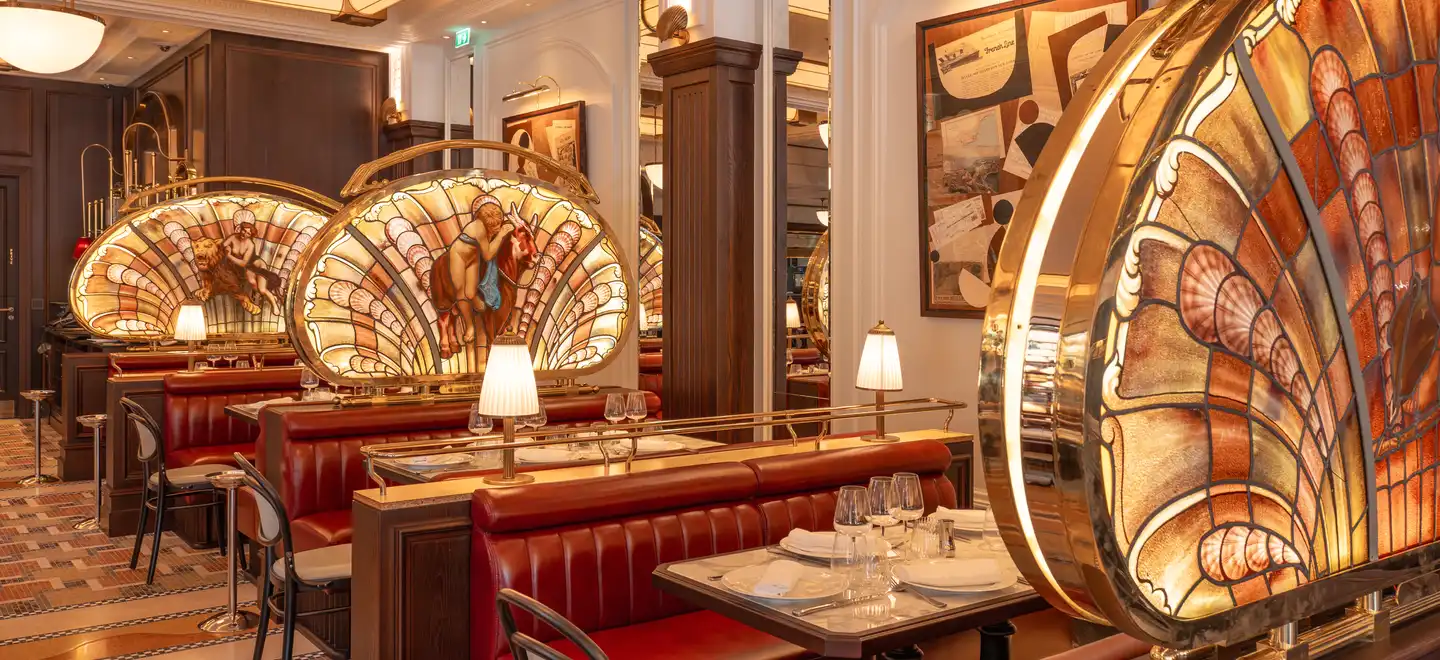
As you mentioned earlier, great houses are the common thread running through your career. What makes a great house ?
It can be the history of the house that makes its reputation. Prestigious establishments that have existed for decades, such as Le Meurice, Le Negresco, Hôtel de Paris Monte-Carlo or Hôtel Hermitage Monte-Carlo. It can also be a great chef at their helm, and then all those who work there and perpetuate the excellence of the name. When you enter these great houses, you absorb the company's DNA, you're drawn upwards, and it drives us to excellence.
You took the helm of an institution: the Café de Paris Monte-Carlo. What did this establishment represent in your imagination ?
It has always represented the timeless brasserie, the one that has stood the test of time, with its canaille cuisine whose mission is to bring a sense of comfort to its customers. For me, it is also the gateway to the Monte-Carlo Société des Bains de Mer establishments for customers.
The first door people can push to enter the glamour and the legend: eating in front of the Casino, a simple dish, having a drink on the terrace... In fact, when I started working in Monaco, my father took me there to enjoy a platter of oysters and smoked salmon; for him, it was the myth. That is the whole point of the place: it is a prestigious establishment known all over the world, and not just by a sophisticated clientele in terms of gastronomy. It is an address known by many, just like the great Parisian brasseries.
What does the menu look like with Victor Marion as chef ?
The Café de Paris Monte-Carlo is a Parisian brasserie on Mediterranean soil. It is a restaurant which has been open since before 1900, built on the great brasserie codes. It is of course a question of maintaining continuity in this great culinary history. It seems to me that there is a marriage of reason to be created between Italian and Monegasque culture, and the codes of a Parisian brasserie. We will be sourcing a lot of our produce, working closely with producers and introducing more seasonality, more movement on the menu. We're also keen to create a cuisine for sharing, to offer customers an experience: a beautiful service in the dining room, a carving, things flambéed... What makes the DNA of these brasseries. It's all about simplicity and living moments. The crêpe Suzette, flambéed in front of people, will continue to amaze, that's for sure.
Are there any new signature dishes ?
The signature is the restaurant itself! Rather than signature dishes, these are recipes we are going to make our own together. Mimosa eggs, leek vinaigrette, pâté en croûte, calf's head, vol-au-vent, flambéed crepe, baba au rhum... A canaille cuisine that appeals to everyone, great classics revisited with our touch, our expertise.
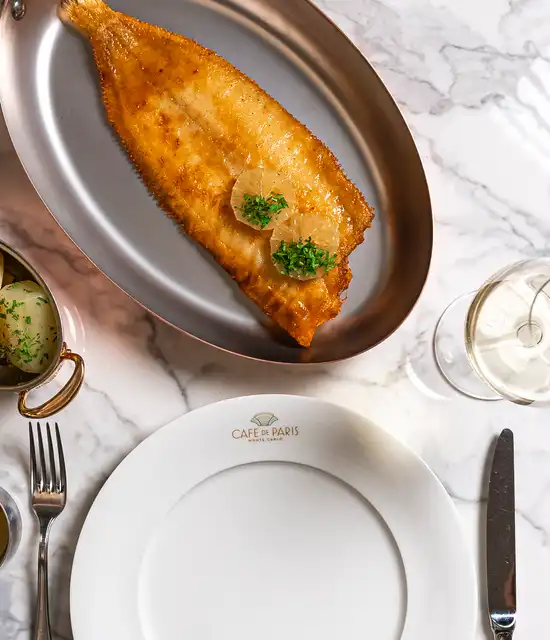
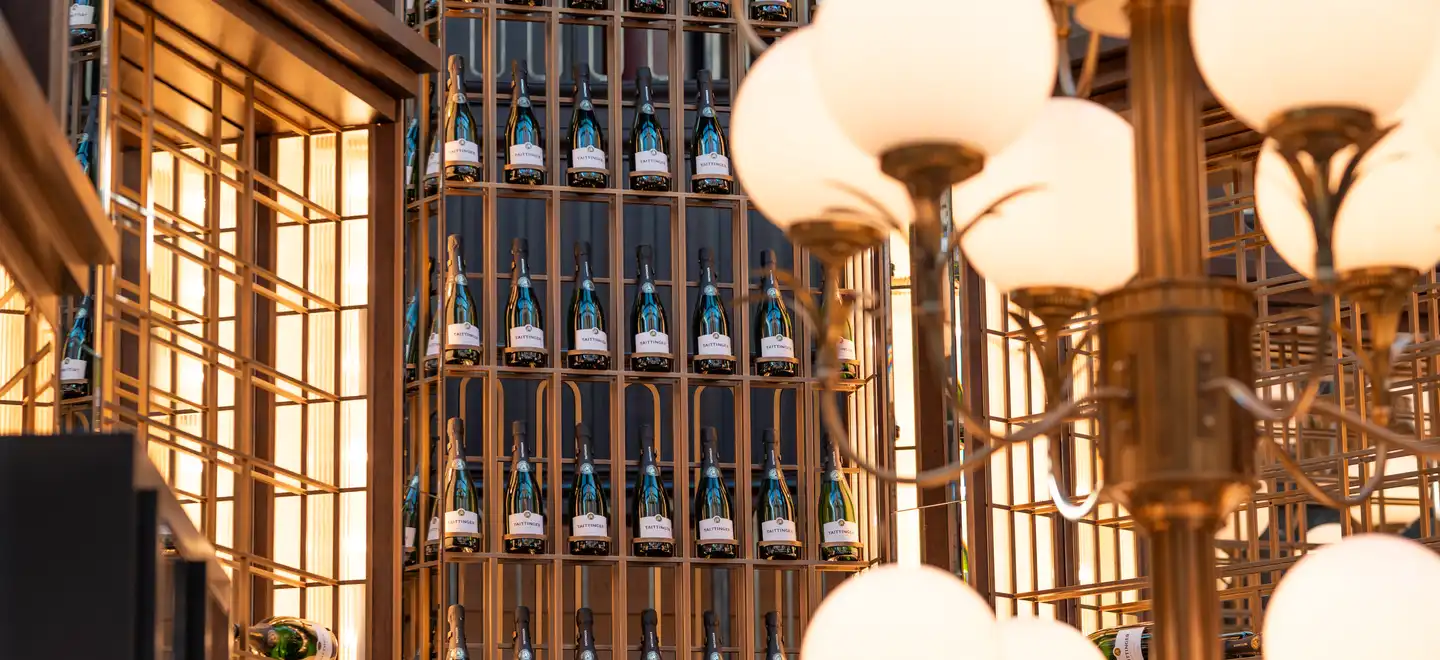
The Café de Paris Monte-Carlo is an establishment open at all hours, or almost. How do you think about that from the kitchen point of view ?
This guiding principle of a restaurant that never sleeps is bound to influence the creation of our menu. Over time, our customers will create our identity through their expectations. They may come for a quick lunch before going back to work, or eat a Milanese veal escalope at 3 p.m. after a walk... At any time of the day, you can order a steak au poivre or a crêpe Suzette at Café de Paris Monte-Carlo. And in the end, it doesn't really matter what time it is. I think a restaurant should have the same identity from morning to night. Customers should have access to similar things at all times.
What can we wish you for this great adventure ?
That the clientele will be there. May we do the Café de Paris Monte-Carlo and this magnificent new venue proud. That's all we can wish for ourselves !
You might also like…
New Moods reopens: let the party begin! Interview with Stéphane Lobono and Alfonso Ciulla
Read the interview with Stéphane Lobono and Alfonso Ciulla about the reopening of New Moods in Monaco, an iconic venue dedicated to live music.

Repossi: high jewellery and avant-garde design. Meeting with Anne de Vergeron
Meet Anne de Vergeron, CEO of Repossi, for a creative and sparkling tour through the history and behind the scenes of this legendary jewellery house.

Emmanuel Pilon: Chef at Le Louis XV - Alain Ducasse in Monaco
Meet Emmanuel Pilon, the new chef at the fine-dining restaurant Le Louis XV - Alain Ducasse in Monaco.
